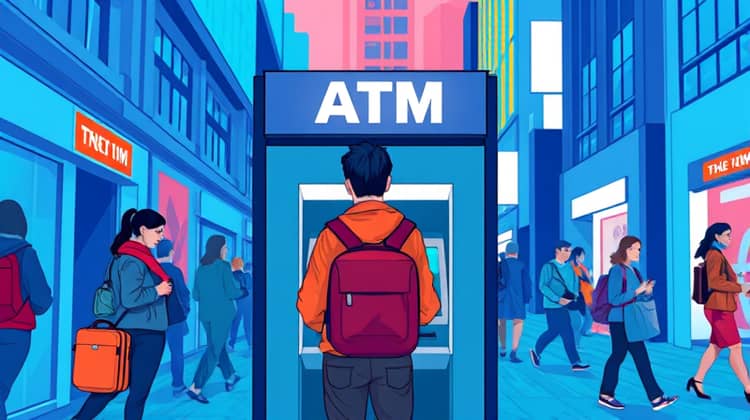Traveling abroad can be an exhilarating experience, but managing your finances while you're away is a crucial aspect that can make or break your journey. One of the most convenient ways to handle expenses internationally is through the use of credit cards. However, unfamiliarity with rules, fees, and currency conversion can lead to unexpected costs or complications.
To ensure you have a smooth financial experience while traveling, we have compiled a list of ten essential tips to help you navigate the world of credit card use abroad. These guidelines cover everything from keeping your bank informed to understanding transaction fees and rates.
By following these practical tips, you'll be better equipped to manage your funds overseas and enjoy your travels without financial stress. Understanding how to utilize your credit card wisely can save you money and give you peace of mind as you explore new destinations.
Let’s dive into the ten essential tips to consider when using credit cards abroad to ensure your financial safety and convenience.
1. Inform Your Bank

The first step to ensure a hassle-free experience with your credit card while traveling abroad is to inform your bank. Most banks and credit card issuers have specific policies regarding international travel to prevent fraud.
By notifying your bank about your travel plans, they can place a note on your account. This helps to prevent your card from being flagged for suspicious activity, which frequently happens if a charge comes from a foreign country.
- Call your bank or use their online platform to notify them of your travel dates and destinations.
- Ask about any specific policies regarding foreign transactions and any potential fees you might incur.
- Confirm that your card will work in the countries you're visiting, including any currency restrictions.
- Note the contact information for your bank or card issuer in case you need to report a lost or stolen card while abroad.
Informing your bank is a small but essential task that can save you a lot of trouble later on. With this precaution, you can avoid the inconvenience of being unable to access your funds when you need them the most.
2. Understand Currency Conversion

Currency conversion can be one of the more confusing aspects of using a credit card abroad. Conversion rates can vary greatly depending on where you exchange currency and how your bank processes transactions.
Understanding how your credit card issuer handles currency conversion can save you money and help prevent misunderstandings about charges. For example, using a credit card that charges competitive rates for international transactions can lead to significant savings.
- Check to see if your credit card has foreign transaction fees associated with currency conversion and international purchases.
- Ask your bank for information about how they calculate exchange rates and if they offer better rates than standard methods available at kiosks or airports.
- Consider credit cards that do not charge foreign transaction fees, which can lead to substantial savings during your travels.
- Keep track of the current exchange rates to know when you're being charged more or less than expected.
Being informed about how currency conversion works can give you a clear picture of your spending and help you budget accordingly while abroad. This knowledge will empower you to make better financial decisions during your travels.
3. Check for Foreign Transaction Fees

Foreign transaction fees are additional charges that some banks and credit card companies impose for purchases made in foreign currencies. These fees can add up quickly if you're unaware of them, making your seemingly reasonable expenses unexpectedly high.
Before you travel, review the terms and conditions of your credit cards to determine if any foreign transaction fees apply. This knowledge is vital in managing your budget and ensuring that you won't be surprised upon checking your statements.
4. Use Credit Over Debit

Using credit cards instead of debit cards can offer many advantages when traveling abroad. Credit cards typically have better fraud protection compared to debit cards, which can provide peace of mind as you navigate unfamiliar environments.
One significant advantage of using credit over debit is that even if a transaction appears fraudulent, you generally won't be held responsible for the charges, provided you report them promptly. Conversely, if someone gains access to your debit account, they can deplete your funds without as much recourse.
Moreover, credit cards often come with additional perks such as travel insurance, purchase protection, and rewards or cashback programs that can enhance your travel experience.
Finally, in many cases, credit cards offer better exchange rates than cash or debit transactions, which allows you to save additional money while traveling.
5. Keep Multiple Cards

Having multiple credit cards can be a lifesaver while traveling. If one card gets lost, stolen, or declines for any reason, having an alternative can ensure that you still have access to funds.
It's a great idea to carry at least two different credit cards from various issuers, as this can provide you with flexibility depending on where you are and the acceptance of different card networks.
6. Contactless Payments Are Your Friend

Contactless payments are increasingly popular for many reasons. Not only are they convenient, but they can also reduce the number of times you need to handle physical cash or cards, which significantly lowers the risk of losing them.
Many countries have embraced contactless technology, so finding retailers that accept this payment method is becoming easier. This can be very useful during your travels.
- Always have your device or card ready to tap when making purchases.
- Keep an eye on your transactions and be sure to check your statements for accuracy.
- Ensure your card’s contactless feature is activated before using it abroad.
Utilizing contactless payments can streamline your shopping experience and enhance your travel efficiency. They are undoubtedly a modern traveler’s best ally.
7. Be Cautious at ATMs

When withdrawing cash from ATMs abroad, it's essential to exercise caution. Skimming devices could be present at some machines, which can lead to unauthorized access to your accounts and loss of funds.
To minimize risk, use ATMs located in well-lit, secure areas, such as bank offices or reputable establishments, and be cautious of anyone distracting you when making transactions.
- Choose ATMs that belong to your bank’s network to avoid high fees.
- If the ATM asks you to choose whether you want to be charged in your home currency—decline that option and choose the local currency instead.
- Always be discreet when typing in your PIN and withdrawing cash.
Taking precautions at ATMs can protect you from becoming a victim of fraud and can keep your finances secure during your travels.
8. Keep an Eye on Exchange Rates

Monitoring exchange rates can be one of the simplest yet effective ways to ensure that you are getting good value for your money. With significant fluctuations impacting your purchasing power, regularly checking these rates can keep your budgeting on track.
Using mobile apps that track real-time exchange rates can help you stay vigilant and make wise purchasing decisions, ensuring that you are not overpaying for goods or services while abroad.
9. Avoid Dynamic Currency Conversion

Dynamic currency conversion (DCC) is a service offered by many merchants when paying with a credit card internationally. This service allows you to see the charge in your home currency rather than the local one, which can seem convenient at first glance. However, it often comes with poor exchange rates and additional fees.
It’s usually better to decline this service and pay directly in the local currency, as this tends to yield more favorable rates and lower overall fees.
10. Remember the Laws and Regulations

Keeping track of the local laws and regulations surrounding credit card use in your destination country is important for joint travel planning. Some countries have restrictions on cards or specific requirements that must be adhered to when making purchases with credit cards.
Additionally, understanding the laws around taxation and credit card transactions can prevent you from accidentally violating them, thus avoiding unnecessary legal trouble.
Summary

In summary, using credit cards abroad can offer convenience and safety, provided you follow specific practices to ensure your financial well-being. Start by informing your bank about your travel plans, and understand how currency conversion and fees will affect your spending. Be mindful of using credit over debit, and keep multiple cards handy to avoid potential issues.
Utilize contactless payment methods, and stay cautious when withdrawing cash from ATMs. Don’t forget to monitor exchange rates and avoid dynamic currency conversion to save on expenses.
Lastly, be aware of the laws and regulations in your destination country regarding credit card use. Following these guidelines can pave the way for a seamless experience when managing your finances while traveling.
High awareness of your spending, protecting yourself against fraud, and smart financial practices can significantly enhance your experience abroad, enabling you to focus more on the adventure and less on your wallet.
Travel with confidence and enjoy your journeys, knowing you have taken the necessary steps to safeguard your finances.














